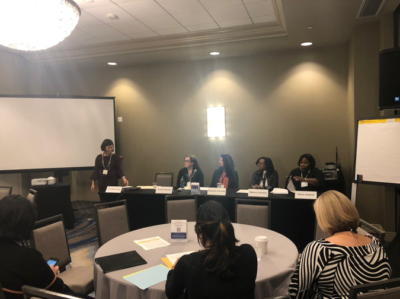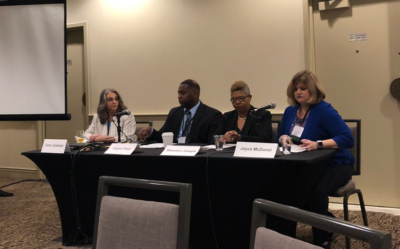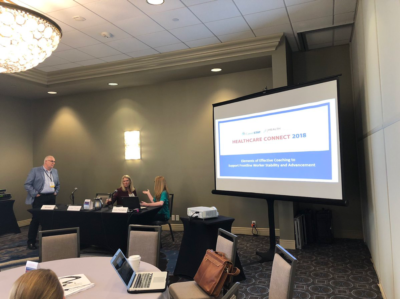“We’re going to help them explore information, and as they make choices with that information, we’ll be there to guide them.” – Laura Thompkins, Program Operations Manager, Easter Seals-Goodwill Northern Rocky Mountains
In this track organizations and providers, discussed strategies to develop multiple pipelines through sourcing local talent and investing in incumbent advancement to fill high demand positions. Many of these healthcare providers are finding creative to address the challenges of recruiting competent, skilled workers in a tight labor market and reach shared goals to improve overall community health.
Track Sessions
-
Session 1 – Leveraging Community Partners to Source Local Talent
-
Session 2 – Creating Internal Pathways for Frontline Workers
-
Session 3 – Elements of Effective Coaching to Support Frontline Worker Stability and Advancement
 Leveraging Community Partners to Source Local Talent
Leveraging Community Partners to Source Local Talent
During the first session, three employers share their experience working with community partners to identify and train local, untapped talent to fill critical workforce needs and discuss the potential impact on community health.
Organizations and Presenters:
- Loh-Sze Leung, Leung Consulting (Moderator)
- Kristin Driscoll, Workforce Development Program Lead, Boston Children’s Hospital
- Jacqueline Chernoble, Vice President of Business Services, JVS Boston
- Monica Johnson Mitchell, Director of Community Relations, Cincinnati Children’s Hospital
- Chara Fisher, Executive Director, Greater Cincinnati Urban League
Discussion Highlights:
- Boston Children’s and JVS have ten years of partnership to provide customized programs designed to resolve conflict and to provide better outcomes; they found being transparent in their needs is important.
- To manage the responsibilities between healthcare employer and CBO partners, Boston Children’s Hospital connected participants with instructive coaching. Up-front buy-in was also key to success.
- Chara Fisher Jackson stated that you need to, “Meet people where they are. If a person isn’t ready for one position, present them with options. Internal coaching to provide supports to move people up through organizations.” And Monica Johnson Mitchell noted that, “Setting expectations early is critical to success.”
Organizations should plan to prove the model first, then sell it across other industries including healthcare, education, and utilities. The programs must demonstrate that they can generate revenue.
 Creating Internal Pathways for Frontline Workers
Creating Internal Pathways for Frontline Workers
Recruiting and promoting incumbent workers into high demand occupations offers employers a pipeline of employees who are a cultural fit and have a strong performance track record. This session focused on the important issues facing frontline workers, the need for transparent career pathways, and the necessary elements needed to create a culture that supports advancement.
Organizations and Presenters:
- Joyce McDanel, Vice President of Human Resources and Education, Unity Point
- Clayton Pryor, Director, Workforce Development, Advocate Aurora Health
- Karen Gresham, Director of Education Services, East Alabama Medical Center
- Shannon Joseph, Director, Workforce Development, Ochsner Health
Discussion Highlights:
- Educating managers and leaders, reducing implicit biases, pushing the anchor mission, and helping people live well doesn’t stop at the bedside. When employees hear from a peer they respect, that knows what they are dealing with; it creates a sense of trust and confidence in the process. They recognize a real investment in frontline workers as employees.
- Building apprenticeship programs and providing training that gives staff the opportunity to advance improves engagement. Part of that if giving supervisors training to help them identify opportunities.
- “Grow Your Own” programs not only provide employees with opportunities but also improves retention and employee engagement. Multi-pronged recruitment helps to attract new talent and to ensure diversity.
Through these training programs, organizations were able to invest in their staff and build a talent pool that provides support to not only patients but the organization as well.
 Elements of Effective Coaching to Support Frontline Worker Stability and Advancement
Elements of Effective Coaching to Support Frontline Worker Stability and Advancement
Career Coaching can have a profound effect on the lives of people who utilize it. There is demonstrated evidence that when frontline workers are offered career coaching and transparent advancement opportunities that organizations achieve a higher level of retention rate of frontline workers. Session two of this track included interactive learning and demonstration to showcase models and tools to implement effective coaching programs. During the session attendees were introduced to utilizing essential data to implement evidence-based coaching, using external resources and programs and how they might build their own in-house coaching program.
Organizations and Presenters:
- Laura Thompkins, Program Operations Manager, Easter Seals-Goodwill Northern Rocky Mountains
- Bill Guest, President and Chief Solutions Architect, Metrics Reporting
- Heather Sprague, Regional CHRO, Saint Alphonsus- Trinity Health West Region
Discussion Highlights:
- Career navigation should be taught at an early age, so individuals can make an informed decision of what they want to do as a career in the future. The goal is to help them explore information, and as they make choices with that information, guide them.
- Career Coaching Steps:
- Self Awareness: Help individuals discover more about themselves, which allows them to understand their strengths and growth opportunities, as they relate to their career.
- Option Exploration: Help participants explore the best job fits based on evidence gathered from the assessments, interests, strengths, and skills.
- Decision Making: By this time, they should know more about themselves, and have a good sense of what they want to do.
- Action Planning: Guide individuals to the next level in their careers. Highlight the skills and training they need to advance.
- Following these steps, also requires follow-up. Continued support is key to help participants continue along their career paths. The level of critical thinking needed to plan the next step in your career is beyond the capability of most people.
Learn about the other workshop tracks at Healthcare Connect:
Designing and Marketing Your Talent Development Strategy
Implementing Healthcare Apprenticeships to Fill Skill Gaps
Adopting Equity and Inclusion Practices for Frontline Workers
The National Fund for Workforce Solutions and Hope Street Group partnered to convene members of CareerSTAT and the Health Career Pathways Network in New Orleans on October 24 and 25, 2018. Healthcare Connect brought together nearly 200 healthcare professionals to share best practices in developing their frontline workforce in full-group sessions and selected breakout workshops. Learn more about CareerSTAT and the Health Career Pathways Network (HCPN).





